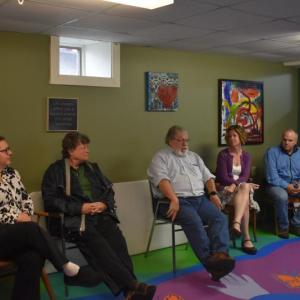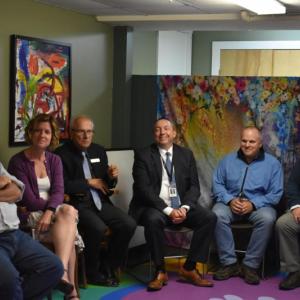Governor Mills spends half hour in Knox County recovery: What works, what needs improvement?
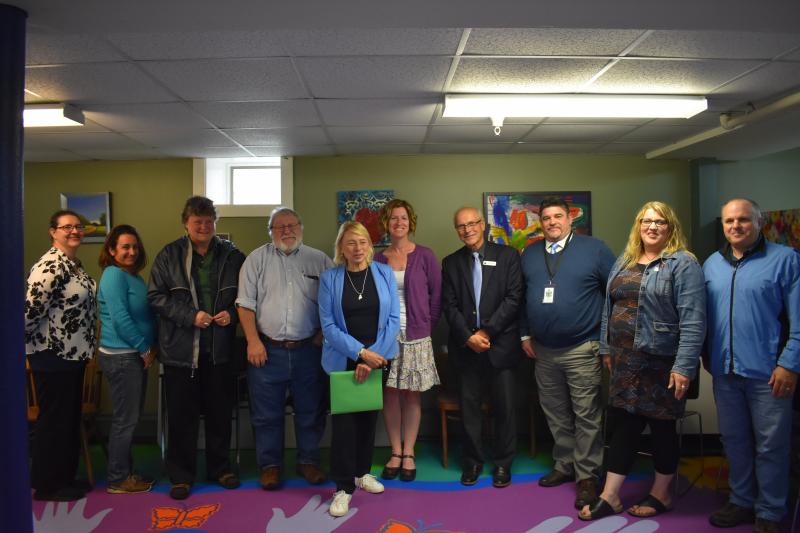 L-R: Erin Hustus, Coastal Community Recovery Center; Theresa Mastricolo, of Pen Bay Medical Center; Pinny Beebe-Center; Bruce Hodsdon, CRCC; Governor Janet Mills; Becky Peasley, CRCC; Gordon Smith, director of Maine’s opioid response; Rob Porter, Maine Office of Behavioral Health; Robyn Goff, Volunteers of America; Bruce Noddin, Maine Prisoner Re-Entry Network. (Photo by Sarah Thompson)
L-R: Erin Hustus, Coastal Community Recovery Center; Theresa Mastricolo, of Pen Bay Medical Center; Pinny Beebe-Center; Bruce Hodsdon, CRCC; Governor Janet Mills; Becky Peasley, CRCC; Gordon Smith, director of Maine’s opioid response; Rob Porter, Maine Office of Behavioral Health; Robyn Goff, Volunteers of America; Bruce Noddin, Maine Prisoner Re-Entry Network. (Photo by Sarah Thompson)
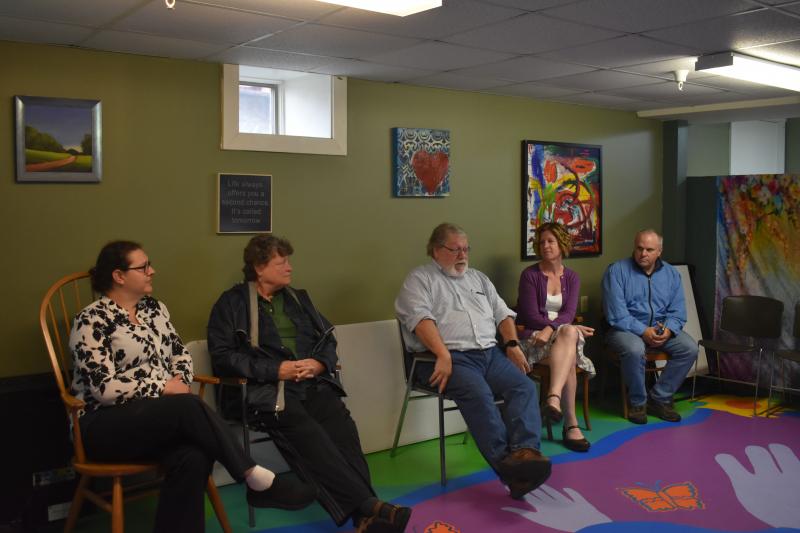 (Photo by Sarah Thompson)
(Photo by Sarah Thompson)
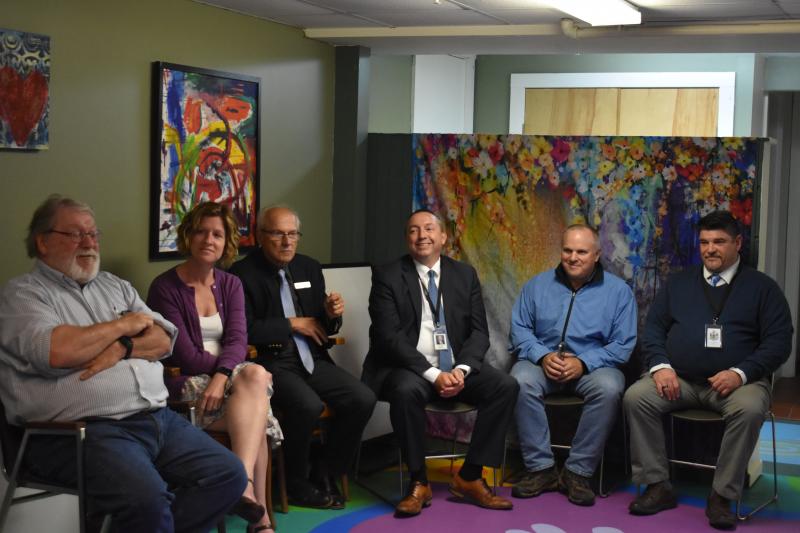 (Photo by Sarah Thompson)
(Photo by Sarah Thompson)
 Not only does CRCC run meetings for people in recovery, seeing an estimated 100 people per month, but they also share resources with other non-profits such as the homeless coalition and Knox County Collaborative. The RSU 13 after-school program painted the floor mural. (Photo by Sarah Thompson)
Not only does CRCC run meetings for people in recovery, seeing an estimated 100 people per month, but they also share resources with other non-profits such as the homeless coalition and Knox County Collaborative. The RSU 13 after-school program painted the floor mural. (Photo by Sarah Thompson)
 A statewide project allows people in recovery, and their families, create puzzle pieces, which are then mixed up and sent to other recovery programs around the state. (Photo by Sarah Thompson)
A statewide project allows people in recovery, and their families, create puzzle pieces, which are then mixed up and sent to other recovery programs around the state. (Photo by Sarah Thompson)
 (Photo by Sarah Thompson)
(Photo by Sarah Thompson)
 L-R: Erin Hustus, Coastal Community Recovery Center; Theresa Mastricolo, of Pen Bay Medical Center; Pinny Beebe-Center; Bruce Hodsdon, CRCC; Governor Janet Mills; Becky Peasley, CRCC; Gordon Smith, director of Maine’s opioid response; Rob Porter, Maine Office of Behavioral Health; Robyn Goff, Volunteers of America; Bruce Noddin, Maine Prisoner Re-Entry Network. (Photo by Sarah Thompson)
L-R: Erin Hustus, Coastal Community Recovery Center; Theresa Mastricolo, of Pen Bay Medical Center; Pinny Beebe-Center; Bruce Hodsdon, CRCC; Governor Janet Mills; Becky Peasley, CRCC; Gordon Smith, director of Maine’s opioid response; Rob Porter, Maine Office of Behavioral Health; Robyn Goff, Volunteers of America; Bruce Noddin, Maine Prisoner Re-Entry Network. (Photo by Sarah Thompson)
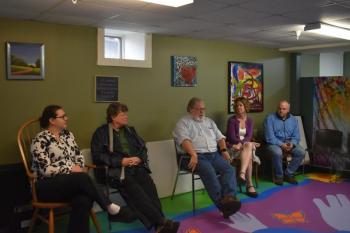 (Photo by Sarah Thompson)
(Photo by Sarah Thompson)
 (Photo by Sarah Thompson)
(Photo by Sarah Thompson)
 Not only does CRCC run meetings for people in recovery, seeing an estimated 100 people per month, but they also share resources with other non-profits such as the homeless coalition and Knox County Collaborative. The RSU 13 after-school program painted the floor mural. (Photo by Sarah Thompson)
Not only does CRCC run meetings for people in recovery, seeing an estimated 100 people per month, but they also share resources with other non-profits such as the homeless coalition and Knox County Collaborative. The RSU 13 after-school program painted the floor mural. (Photo by Sarah Thompson)
 A statewide project allows people in recovery, and their families, create puzzle pieces, which are then mixed up and sent to other recovery programs around the state. (Photo by Sarah Thompson)
A statewide project allows people in recovery, and their families, create puzzle pieces, which are then mixed up and sent to other recovery programs around the state. (Photo by Sarah Thompson)
 (Photo by Sarah Thompson)
(Photo by Sarah Thompson)
“We know this, and we want to know how we can overcome those numbers,” said Governor Janet Mills, during a stop at a recovery center in Rockland, June 8, 2022. “We hear a lot about the overdose statistics, and that is a national phenomenon. It’s been exacerbated by the pandemic…. The number of ambulance runs, the number of deaths, the number of overdoses that aren’t fatalities but are just as in need of our help.”
The Governor spent 30 minutes at Coastal Recovery Community Center, but instead of being interviewed, Mills was the one asking the questions.
In a relaxed roundtable discussion, Mills heard from founders of the CRCC, along with joint space occupants Volunteers of America. With them were Pinny Beebe-Center, Commissioner of Public Safety Michael Sauschuck, Rob Porter of Maine department of Behavioral Health, and Gordon Smith, director of Maine’s opioid response department.
The meeting scoped for a status of what Knox County is seeing in terms of substance abuse recovery, what lies ahead, and what lags behind.
Medical assisted treatment (MAT) was incorporated at the Knox County Jail years ago, under the determination of Sheriff Tim Carroll, but two factors have kept drug recovery meds limited within the jail.
The first is the 60-day wait period for people requesting MAT for the first time. That waiting period allows for education of the different pathways to recovery.
“So at the end of 60 days, it might be the medicated treatment, but it also might be the arts, or 12-Step, or something else,” said Robyn Goff, of Volunteers of America.
The second issue has been a lack of prescribers at the jail.
A nurse practitioner works at the Knox County Jail, the Re-entry Center (in Belfast), and Two Bridges, and therefore there’s a limit in how many people can be served.
“The Knox County Jail has only now changed for this year, and provides more trained people to interact with the population,” said Beebe-Center. “Policies are beginning to change now that we have the resources and the follow through.”
Mills spoke about how, when she took office 3.5 years ago, she introduced a 10-point plan. Two of the major points were to distribute Narcan as widely as possible and training of recovery coaches. She took settlement funds from pharmaceutical litigation and bought a room full of Narcan.
“That alone saved thousands of lives,” she said, then continued, “It’s not about saving one’s physical life, it’s about giving them a lifesaver.”
This leads to her second point: “A recovery coach, to me, is analogous to what we’ve done with domestic violence and sexual assault. Someone appears at a hospital, a victim of domestic violence, we don’t just put bandaids on. We call in a special council.”
There are now over a thousand recovery coaches trained in Maine, she said. At the same time, the administration funneled federal money and some state money into recovery programs, residential and non residential.
Just prior to the recovery center stop, Mills ate lunch with a business group. The topic of conversation revolved around staffing shortages, and one idea floated was to tap into the recovery community.
“Hubert Humphrey used to say, ‘the best social program is a job,’” said Mills. “Work is therapeutic, as well, and if you have a community that needs to put their energy into work, we’ve got work available.”
Beebe-Center said that there are a number of companies in this area that are committed to learning how to deal with people in recovery, to support them.
Mills asked if there was anything the State could do to help. Maine expanded the apprenticeship program through the Maine Department of Labor. There’s also a focus on minorities, women, non-traditional occupations, justice-involved individuals, and people in recovery.
Speaking from experience, Goff said that hiring people with “lived experience” also comes with challenges, particularly in regards to workers having recovery coaches who shouldn’t have qualified for that title.
Goff said that some of the Law Enforcement Assisted Diversion (LEAD) program policies have been too limiting for working with individuals. One example said that if you meet with a case manager three times in 30 days, you are a successful completion.
“Well, everybody knows in this room that 30 days is not enough time to work with an individual on changing their life.”
Therefore, part of proposed spinoff program, LEAD expansion, is to not limit the 30 days, which will allow a case manager to work with the individual wherever they are at in the system, be it pre-arrest, incarceration, or release.
Along with that, in the future, this region is anticipating a drug court that will start in Knox County, and then go to Waldo, and then Lincoln, and then Sagadahoc. A judge has been assigned, and referrals have started to accumulate.
“It’s really hard work to reach out to people after they survived an overdose, and encourage them to find a pathway to treatment,” said Smith. “And yet, if we don’t, the drug supply is so lethal right now….We had another one year old get into fentanyl –I believe that that child is alive. We get one of these now on a too-regular basis. There’s just so much to be done.”
CRCC now has the ability to give naloxone at any time, according to Erin Hustus, one of the founding members of Coastal Recovery Community Center. A person can simply walk in and get some.
“You tell your first name, and then how many,” said Hustus.
Hustus also works in the school system and sees a need to reach children early when it comes to drugs. Yet substance abuse education is usually left until a point in the school year when teachers have time to generate that discussion, which often comes at the end – if at all.
Mills asked if people understand how extraordinarily dangerous fentanyl is. Hustus said that people are learning. This past Sunday, Hustus was involved in an open forum that taught the public about narcan and fentanyl test strips.
“It was really great to see parents...I knew they weren’t active users, but they are parents of children who are getting anything and everything,” she said. “Our community is open to the information, and I think that that is really the first step.”
Event Date
Address
11 White Street
Rockland, ME 04841
United States


